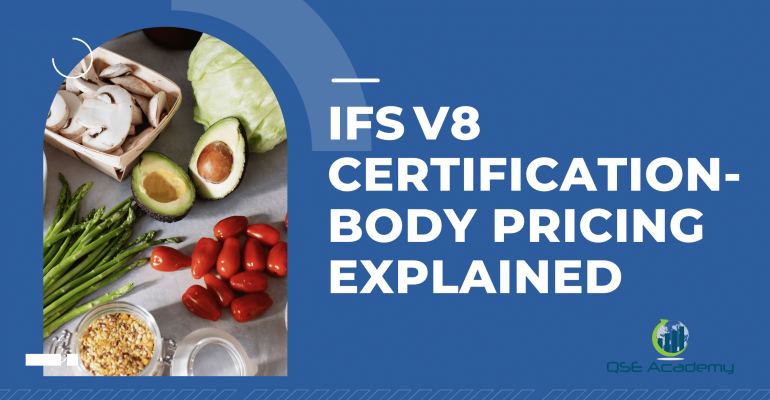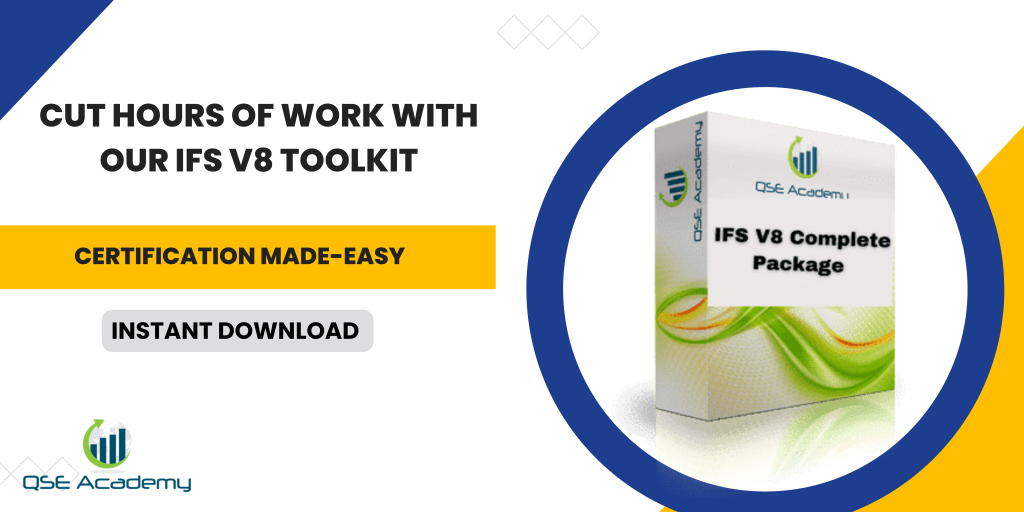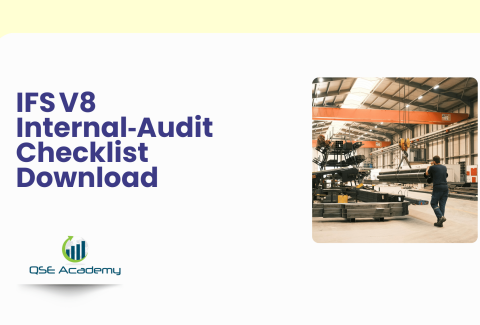IFS V8 Certification‑Body Pricing Explained
Last Updated on November 19, 2025 by Melissa Lazaro
Understanding IFS V8 Audit Pricing (Expert Breakdown)
When companies approach us for help with IFS V8 implementation or certification planning, one of the first questions they ask is always the same: “How much will the audit cost?” And I get it—budgeting is hard when every certification body gives a slightly different price, with different formats, wording, and fee structures.
I’ve supported food manufacturers, logistics operations, and trading companies through IFS audits for more than a decade. Along the way, I’ve compared dozens of quotation formats, helped teams negotiate fair pricing, and prevented unnecessary audit cost increases simply by clarifying scope before signing a contract.
If you’re reading this, you’re likely trying to create a realistic budget, avoid surprise expenses, and understand what’s driving the numbers behind IFS certification. By the time you finish this article, you’ll know:
- The key elements that certification bodies use to calculate pricing
- What drives audit duration (and cost) under IFS V8
- Common hidden fees and how to spot them
- When negotiation makes sense and when it doesn’t
- How costs evolve after year one
This clarity gives you control—not just over budgeting, but over planning and decision-making.
How Certification Bodies Calculate Costs — IFS V8 Pricing Model Explained
Pricing usually starts with a simple structure:
Audit duration × daily auditor rate + administrative and certification fees.
But what’s behind that formula isn’t always obvious.
Certification bodies look at several factors:
- Number of employees
- Complexity of processes
- Number of products and categories
- Food safety risks tied to ingredients and processes
- Whether the audit is announced or unannounced
- Whether the site is new to IFS or already certified
Here’s what I’ve noticed over the years: most companies underestimate how much scope influences cost. One client—small bakery, single facility—expected a mid-range quote. But because they produced allergen-sensitive SKUs and high-risk ready-to-eat products, the daily rate and duration increased.
Pro tip: Always give the certification body an accurate scope description early. It prevents inflated assumptions and unnecessary complexity.
A common mistake is requesting quotes before defining scope clearly. Without clarity, certification bodies build in “risk buffer pricing.” That usually means higher audit duration or extra specialists.
 Audit Duration & Man-Day Calculations — The Core Cost Driver
Audit Duration & Man-Day Calculations — The Core Cost Driver
IFS V8 introduced some updated rules for determining audit duration. And this matters because time equals cost.
Duration depends on:
- Number of FTEs (full-time equivalent employees)
- Production shifts
- Material-risk category
- Level of automation
- Whether HACCP and documentation are mature
- Past performance (if previously certified under IFS)
In my experience, companies with mature systems, clear traceability, and organized documentation often finish audits efficiently—sometimes even reducing onsite time over future cycles.
Pro tip: When you provide workforce numbers, include seasonal variations. Under-reporting may trigger reassessment or—even worse—surprise invoice adjustments.
A common pitfall is forgetting that multi-shift production increases required audit time, even if the workforce isn’t huge.
Hidden Fees & Cost Add-Ons — What Most Companies Miss
The quoted price isn’t always the final price. Some certification bodies include everything; others separate items into add-ons.
Possible additional costs include:
- Travel and accommodation
- Certificate issuance fees
- Document review fees
- Translation services (common in EU audits)
- Extra sampling or technical reviewers
- Fees for unannounced audits
- Follow-up or corrective action verification audits
One logistics client learned this the hard way. Their contract didn’t specify whether the follow-up audit after a major non-conformity was included. It wasn’t—and that extra day cost them more than €1,400.
Pro tip: Ask for a quote with a detailed breakdown of what’s included—and what’s not. If the proposal only states a lump sum, request clarification.
Multi-Site, Broker, and Logistics Pricing — Special IFS V8 Scenarios
Not every organization follows a simple single-site manufacturing model. IFS pricing varies significantly for:
- Multi-site operations
- Brokers and traders
- Logistics and storage providers
For example, a broker typically has lower onsite audit time because there’s no physical production risk. But logistics companies storing allergens or fragile perishable goods may require specialized auditor competence—sometimes increasing price.
One company I worked with reduced audit costs by combining IFS Logistics and ISO 22000 surveillance audits with the same certification body. When scheduling and scopes align, this strategy can cut travel fees and man-days.
That said, combining audits only works when the CB has accreditation for all required schemes and competent auditors available.
Negotiating With Certification Bodies — How to Secure Fair Pricing
Negotiation isn’t about driving the price as low as possible—it’s about ensuring the pricing aligns with reality and value.
Questions worth asking:
- Is the auditor experienced in my sector?
- Is the quotation based on IFS V8 duration tables?
- Are follow-up audits included in the fee?
- Is unannounced audit pricing fixed or variable?
- Are travel costs capped?
Comparing offers apples-to-apples is key. I’ve seen companies select the cheapest quote, only to learn later that travel fees, certificate fees, and follow-up audits weren’t included—making the total cost much higher than the “expensive” option.
Pro tip: Choose competence and transparency over the lowest invoice. A poorly qualified auditor can cost far more in corrective actions and repeat audits.
Budgeting Beyond Year One — Surveillance, Recertification & Unannounced Audits
Initial certification is often the most expensive year. After that, cost usually stabilizes—unless the company undergoes major process changes or expansion.
There are three phases:
- Initial Certification Audit — full review, longest duration
- Surveillance Audit (Years 2 & 3) — slightly shorter duration
- Recertification Audit (Cycle Renewal) — near full audit again
Unannounced audits under IFS often cost more because they require flexible planning and auditor availability.
Some certification bodies offer multi-year contracts with fixed pricing, which helps with long-term budgeting.
A mistake I see often: planning only for Year 1 and forgetting that surveillance audits have separate contracts and fees.
FAQs — IFS V8 Certification Pricing Questions Answered
How much does IFS certification typically cost?
Most audits fall between €6,000 and €18,000, depending on scope, size, and operational complexity.
Can we reduce costs without risking non-compliance?
Absolutely. Accurate scope, organized documentation, combined audits, and selecting a CB with relevant sector competence all help control cost.
Do prices decrease after certification?
Often yes—surveillance audits take slightly less time. But this depends on performance, non-conformities, and whether scope increases.
Conclusion — Your Next Step Toward a Clear and Fair IFS V8 Audit Budget
You now have a clearer view of how certification bodies calculate pricing, where costs come from, and what influences changes over the three-year cycle. The right preparation and transparency can prevent unnecessary audit duration, unexpected fees, and budget surprises.
I’ve guided many organizations through this process—from first contact with a certification body to maintaining certification year after year. If you want help estimating a realistic budget or comparing quotes, reach out. Sometimes a 20-minute discussion saves thousands.
If you’d like, I can now create:
- A downloadable pricing comparison template
- A pre-audit scope checklist
- Or a negotiation script for contacting CBs
Melissa Lavaro is a seasoned ISO consultant and an enthusiastic advocate for quality management standards. With a rich experience in conducting audits and providing consultancy services, Melissa specializes in helping organizations implement and adapt to ISO standards. Her passion for quality management is evident in her hands-on approach and deep understanding of the regulatory frameworks. Melissa’s expertise and energetic commitment make her a sought-after consultant, dedicated to elevating organizational compliance and performance through practical, insightful guidance.








